People
Current Members
Rogers Hall (he/him)
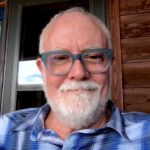 Vanderbilt University, Wachtmeister Family Professor of Education, Emeritus
Vanderbilt University, Wachtmeister Family Professor of Education, Emeritus
Rogers Hall is the Wachtmeister Family Professor of Education and Learning Sciences, Emeritus at Vanderbilt University. He studies learning and conceptual practices in STEM disciplines, using interaction and comparative analysis of persons engaged in community practices. Some studies are of doing and learning in intact activity systems. In related studies, Rogers designs experimental learning environments for new modes of engagement in conceptual practices. While co-directing the Space, Learning and Mobility (SLaM) Lab, Rogers has contributed to design studies of learning:
- in ensemble and embodied activity (e.g., “walking scale geometry” and dance choreography for mathematics learning),
- when mobility is both the means and content of what is learned (e.g., youth mobility and counter mapping, shaping engagement during family museum visits),
- by making and following “story lines” that share public history as walking experiences (e.g., digital spatial storytelling in classrooms and a community museum),
- by reflecting on relations between personal geography and thematic maps that model society and history (e.g., telling stories with open, large-scale data and mapping self in society), and
through hearing and listening in popular culture (e.g., close listening and soundscaping).
Rogers holds a Ph.D. in computer science from UC Irvine (1990) and taught at UC Berkeley before joining the Vanderbilt faculty. He is a fellow of the American Educational Research Association and of the International Society of the Learning Sciences. He was a residential fellow at the Center for Advanced Study in Behavioral Sciences (Stanford University, 2007-2008), the UC Humanities Research Institute (2001), and the Max Planck Institute for the History of Science (1999). He was also a NAE/Spencer Foundation and McDonnell Foundation postdoctoral fellow (1996-1997). Rogers is a dedicated swimmer and makes things in his garage (What’s he building in there?).
D Teo Keifert (they/them)
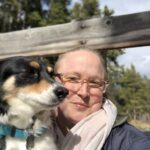 University of North Texas, Assistant Professor
University of North Texas, Assistant Professor
I am a learning nerd. I love studying learning and my own learning that accompanies that work. I study learning both in and out of school, with a focus on young children’s brilliance, inquiry, and connections to science. IA is my central method, but you’ll find me pulling on Goodwinian Co-Operative Action to extend my scales (e.g., analytical unit grain size, time) to examine power, social structures, and cultural practice in interaction. You can find more official (and lengthy) bios on my UNT faculty page and personal webpage. I am the human to Aurelia Grace (Gracie, rescue pup), appropriately named after Caesar’s mother given her intelligence and fierce loyalty (I said I was a nerd). I am a new ambulatory wheelchair user and trying to find my way in the disabled community after having lived an (unacknowledged) disabled lifetime already. All of this brings me joy and I am so grateful for the opportunities of shared sensemaking in VIAL for myself and my UNT graduate students.
Nadav Ehrenfeld (he/him)
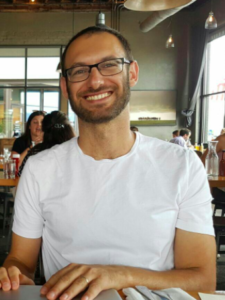 Vanderbilt University, Postdoctoral Scholar
Vanderbilt University, Postdoctoral Scholar
My research focuses on mathematics teaching, classroom interaction, and teacher learning, exploring questions such as how to support teachers’ professional development in ways that focus on their experiences, interests, and concerns. I use IA methods to study students’ and teachers’ collaborative sensemaking with specific attention to their broader learning-ecologies. In my free time I enjoy coffee, mountains, and hanging out with pirates (aka my kids).
Lauren Vogelstein (she/her)
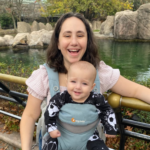
New York University, Postdoctoral Associate
I am a dancer, learning scientist, and IA nerd. In specific I love IA methods for how they allow us to ask questions about the many kinds of interactional co-accomplishments that constitute learning. I also have been asking questions about we can expand IA methods to include theoretical and axiological commitments about the role of the body in IA. In addition to geeking out about methods of viewing, responding to, and learning from data, I also love geeking out about creating data representations. My IA video editing skills have also come in handy for making birthday music videos for loved ones. Smile squinter and proud mamma.
Bethany Daniel (she/her)
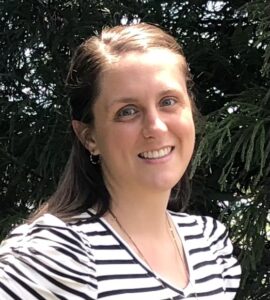
Vanderbilt University, Doctoral Candidate
Bethany’s work focuses on how teachers and teacher candidates engage in ideological sensemaking about equity-related issues in their contexts. She uses IA to explore how teachers learn in community with each other. When not scrubbing through video data, Bethany loves taking nature walks and browsing used bookstores.
Natalie De Lucca (she/her)
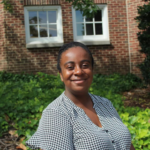 Vanderbilt University, Doctoral Candidate
Vanderbilt University, Doctoral Candidate
Natalie often thinks about learners’ socio- ethical & technical sensemaking in physical science and engineering contexts to design more justice-oriented and care-attuned STEM learning spaces. In rare moments she is stealing time away for either coffee & a good book or chocolate & terrible reality TV.
Emma D. V. Reimers (she/her)
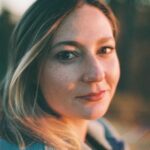 Vanderbilt University, Doctoral Candidate
Vanderbilt University, Doctoral Candidate
Emma researches the social construction of listening and the possibilities for social change afforded through the ensemble practice listening together. Her interest in Interaction Analysis stems from a critical media lens and includes use of 360 and immersive VR video technologies by interactants on their own data alongside experts. If you see Emma in the wild, she’ll probably be playing with her dogs Ringo and Potato or making her Italian ancestors proud by cooking pasta from scratch.
Lana Ćosić (she/her)
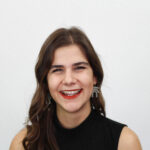
Vanderbilt University, Doctoral Student
Lana Ćosić is a doctoral student in the Department of Teaching and Learning at Vanderbilt University’s Peabody College, exploring the intersection of embodied cognition, science learning, and theatre. As her work seeks out how individuals and ensembles use their bodies to learn, Lana leverages IA to track indications of emergent shared understandings and representations. Outside of academia, she enjoys tinkering in her garage-turned-makerspace and a good snuggle on the couch with her dog.
Tessaly Jen (she/her)
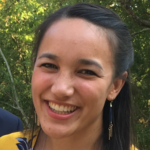
Vanderbilt University, Doctoral Student
Tessaly explores how youth make sense of human-nature relationships as they engage in science learning. She’s interested in designing and studying learning environments that support heterogeneous ways of knowing, doing, and being in science towards more just and care-filled socioecological systems. Tessaly loves the opportunity to learn with and from the VIAL community. She is continually amazed by the insights that can be gleaned from micro-moments of video data when a bunch of nerds get together to watch, rewatch, discuss, and ponder. In the elusive free-time of a graduate student, Tessaly can be found running and biking along Nashville’s greenways, hiking, taking dance classes, and slowly cooking and baking her way through her multiple shelves of cookbooks.
Candice Love (She/They)
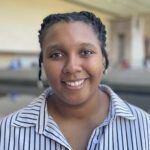 Vanderbilt University, Doctoral Student
Vanderbilt University, Doctoral Student
Candice’s interest is in the mathematics that can be found in the games that Black people play. They use IA to explore how the body is used in mathematical sensemaking, especially in contexts where the mathematics is a joint accomplishment between multiple members. They hope to build theory around Black playfulness and its role in mathematical activity to further expand what we believe “counts” as math to better include centers of Black culture and joy.